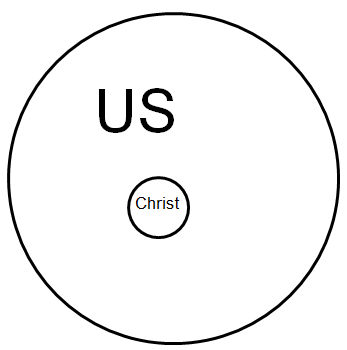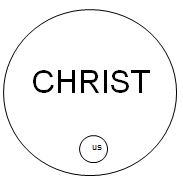One of the first problems Paul had to deal with was the fact that people had favourites within the church: he had to remind his readers that preaching the Gospel was the most important thing for him. But there too he had a problem. He found that for many, preaching was not enough; they needed every question answered before they could believe.
What is the difference between telling people the ‘Good News’ and explaining it?
How much time should we spend explaining, when non-Christians say they don’t understand our faith?
Should we expect people to be converted if they will just allow us the time to carefully explain the way of salvation?
We may have to spend time explaining what we mean, but people can never be persuaded to come to Christ by clever arguments. That may well produce a mental assent, but only the work of the Holy Spirit can change the heart.
Read 1 Corinthians 1:18-31
18 For the message of the cross is foolishness to those who are perishing, but to us who are being saved it is the power of God. 19 For it is written:
‘I will destroy the wisdom of the wise;
the intelligence of the intelligent I will frustrate.’
20 Where is the wise person? Where is the teacher of the law? Where is the philosopher of this age? Has not God made foolish the wisdom of the world? 21 For since in the wisdom of God the world through its wisdom did not know him, God was pleased through the foolishness of what was preached to save those who believe.
22 Jews demand signs and Greeks look for wisdom, 23 but we preach Christ crucified: a stumbling-block to Jews and foolishness to Gentiles, 24 but to those whom God has called, both Jews and Greeks, Christ the power of God and the wisdom of God. 25 For the foolishness of God is wiser than human wisdom, and the weakness of God is stronger than human strength.
26 Brothers and sisters, think of what you were when you were called. Not many of you were wise by human standards; not many were influential; not many were of noble birth. 27 But God chose the foolish things of the world to shame the wise; God chose the weak things of the world to shame the strong. 28 God chose the lowly things of this world and the despised things – and the things that are not – to nullify the things that are, 29 so that no one may boast before him.
30 It is because of him that you are in Christ Jesus, who has become for us wisdom from God – that is, our righteousness, holiness and redemption. 31 Therefore, as it is written: ‘Let the one who boasts boast in the Lord.’
In verses 18-21 Paul now compares wisdom and foolishness.
But first, what is wisdom? And foolishness?
Wisdom, we could say, is ‘making the best use of knowledge and experience’
And foolishness is not ‘making the best use of knowledge and experience’
Display ‘WISDOM is making the best use of KNOWLEDGE’
But, what is the difference between wisdom and intelligence? How would you explain intelligence? The dictionary says intelligence is ‘mental abilities, such as the capacities for abstract thought, understanding, communication, reasoning, learning, learning from past experiences, planning, and problem solving’.
But our intelligence can only be based on what we know.
Look at the phrase in verse 19 ‘the intelligence of the intelligent I will frustrate’
It can be the most frustrating thing when you have applied all your intelligence to a problem, come to a definite understanding, and then been proved to be completely wrong. We don’t like that – we like to think we’ve got a good brain and can work things out for ourselves. Unfortunately if we don’t know God we can only base our understanding or intelligence on wrong information, and when God reveals his truth – his Gospel – it becomes obvious that our wisdom is actually foolishness: verse 20.
But if we can’t accept that we are wrong, then Christ’s Gospel must be wrong.
So, the wisdom of the world, wise men, philosophers, and scholars, had all concluded that the gospel was ‘foolishness’ and ‘a stumbling-block’.
When God planned his way of salvation, it could not be in his loving nature to only make it accessible to the wise or intelligent. He actually chose a way that many people thought was ‘foolishness’ because then ordinary people could understand and respond to his message. (verses 26-29)
For those who believe, we have indeed found that (v25) ‘the foolishness of God is wiser than man’s wisdom, and the weakness of God is stronger than man’s strength.’
Look at verses 22-31
The New Living Translation summarises the problem as:
22 It is foolish to the Jews, who ask for signs from heaven. And it is foolish to the Greeks, who seek human wisdom. 23 So when we preach that Christ was crucified, the Jews are offended and the Gentiles say it’s all nonsense.
Greeks in particular responded to the mental stimulus of philosophical argument and for them the Gospel raised more questions than it answered. They wanted to understand the whole gospel message intellectually before they could respond to it.
But is it right to say that the message of the cross is primarily directed at the heart and soul, rather than the mind?
For the Jews, however, they had been taught what kind of messiah to expect – now they just needed miraculous proof that Jesus was the Christ. But that is putting the cart before the horse: we first need faith to believe – only then will we see the many miraculous proofs!
Many people today will only believe something if they can prove it’s true. They cannot grasp the idea that faith is just believing!
But also, for the Jews, the message of Christ crucified really was a stumbling-block (v23). They were expecting a Messiah who was strong, powerful and above all – living! For the Greeks too, the idea of a crucified God was utter foolishness, totally ridiculous.
Actually for those who have the faith to believe (v24) Christ is the power of God and the wisdom of God.
Let’s look at who, and what God in his wisdom chose to spread his message). God actually chose the foolishness of preaching (v21), he chose people who were not wise, influential or of noble birth (v26) he chose the foolish things of the world (v27) and he chose weak things (v27) lowly things (v28) even despised things (v28).
Why? Verse 29 – so that nothing and nobody may boast before him. Why is that so important? We could end up taking the glory due to his name – and 1 Corinthians 1:17 – the cross of Christ be emptied of its power.
Is there a danger that we might still boast? What about? (What we have done).
So because there is still a chance that we might boast Paul reminds us of our position 1 Corinthians 1:30 It is because of him (God) that you are in Christ Jesus.
(The study in John chapter 15c expands on the fact that Christ is in us, and we are in Christ.) (Display: Christ in Us and Us in Christ
Christ in us

We like the ‘Christ in us’ picture because it makes us feel more comfortable, we feel that in some way we can control Jesus. He can be nearer or further away from our heart as our feelings change. We carry him with us wherever we go. We can even boast that ‘now I belong to Jesus, Jesus belongs to me’.
(Or more recently, ‘I am yours, Jesus, you are mine’ – from ‘The Greatest day in History’ by Tim Hughes and Ben Cantelon)
Us in Christ

But the picture of ‘us in Christ’ is more uncomfortable. It reminds us that we are small, and not in control, but as we think about it we should realise that it is the safest place to be.
If we are still thinking of boasting, v30 reminds us that It is because of him that you are in Christ Jesus and v31: Therefore, as it is written: “Let him who boasts boast in the Lord.”
This is picked up in Paul’s letter to the Ephesians 2:6-9 where we are reminded:
‘6 And God raised us up with Christ and seated us with him in the heavenly realms in Christ Jesus, 7 in order that in the coming ages he might show the incomparable riches of his grace, expressed in his kindness to us in Christ Jesus. 8 For it is by grace you have been saved, through faith—and this not from yourselves, it is the gift of God—9 not by works, so that no-one can boast.’
It is easy when reading scripture for us to skip over familiar words. But they are there for a purpose – so let’s look at the rest of v30: ‘It is because of him that you are in Christ Jesus, who has become for us wisdom from God—that is, our righteousness, holiness and redemption’
What do we understand by ‘wisdom from God’ ? We said before that wisdom was ‘making the best use of knowledge’. It might help to point out that the opposite of wisdom is folly, foolishness, stupidity or ignorance. Also Ephesians 1:7-9 has:
in accordance with the riches of God’s grace 8 that he lavished on us. With all wisdom and understanding, 9 he made known to us the mystery of his will
Remember, he has become for us, for those who have believed and accepted Jesus. For us, God’s plan of salvation makes perfect sense: by accepting the fact that as sinners we faced an eternity cut off from God and so needed salvation. A plan that freely provides it by placing us in Christ, thus giving us his righteousness and so making us holy, is truly wisdom from God.
The fact that to purchase our redemption meant that it cost Christ his own life demonstrates God’s wisdom; the fact that Christ was obedient demonstrates his love.
Paul keeps on the theme of wisdom in chapter 2 (remember that there were no chapter breaks in his original letter!).
1 Corinthians 2:1-5
1 When I came to you, brothers, I did not come with eloquence or superior wisdom as I proclaimed to you the testimony about God. 2 For I resolved to know nothing while I was with you except Jesus Christ and him crucified. 3 I came to you in weakness and fear, and with much trembling. 4 My message and my preaching were not with wise and persuasive words, but with a demonstration of the Spirit’s power, 5 so that your faith might not rest on men’s wisdom, but on God’s power.
Paul, in his wisdom, deliberately chose to bring a simple gospel message. We saw that his audience were converts from
- knowledgeable Jews and
- intelligent Greeks
— both of whom loved a good religious argument.
He was well able to preach a powerful sermon using wise and persuasive words that would establish himself as an equal to the teachers and philosophers in their midst.
But what effect would that have had? It would immediately have encouraged debate and discussion, raising his status in the eyes of the people, and drawing the conversation away from the Gospel.
Instead Paul was weak, fearful, even trembling as he brought a simple message full of the Spirit’s power – and it was by the Spirit’s power that they had been convicted and converted.





